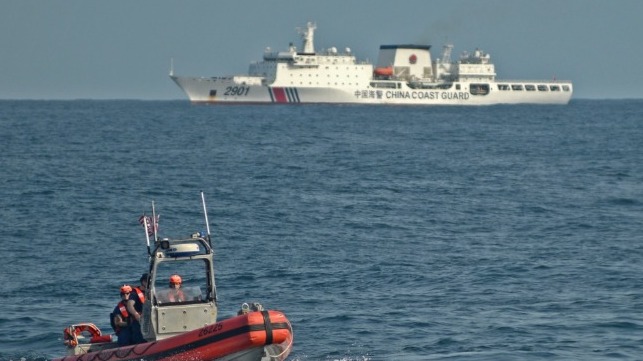Philippine Fishermen Call on UN to Invalidate China's Coast Guard Law

The Philippine artisanal fishermens' association Pamalakaya has called on the UN to declare China's new Coast Guard Law "null and void," asserting that Beijing's new rules of engagement for the agency are incompatible with international law.
The new law authorizes the China Coast Guard to “take all necessary measures, including the use of weapons, when national sovereignty, sovereign rights, and jurisdiction are being illegally infringed upon by foreign organizations or individuals at sea." Draft text suggests that the new rules would authorize Chinese maritime law enforcement personnel to use small arms if required by the circumstances of a perceived infraction, based on the "nature, degree and urgency" of the case. In the event of more serious non-compliance, the use of deck guns would be permitted. Controversially, it also authorizes the CCG to dismantle foreign-built structures on Chinese-claimed land features.
According to Pamalakaya, the law's provisions are "undisputedly an act of aggression" against neighboring coastal states. China claims about 90 percent of the South China Sea as its own, including vast swaths of its neighbors' exclusive economic zones. Chinese forces have occupied multiple Philippine-claimed land features in the Spratly Islands and turned them into sophisticated military bases, and its work is not over: new satellite imagery analysis by the consultancy Simularity indicates that as recently as December, Chinese forces were continuing to install new structures on Philippine-claimed Mischief Reef.
Pamalakaya is concerned that the new use of force authorization for the China Coast Guard - combined with the heavy Chinese presence in contested areas - may be a "threat to livelihood and security of claimant nations’ respective fisherfolk,” according to national chairman Fernando Hicap.
“This militarization should not only concern the claimant countries, but the international community as well," said Hicap. "It is high time for every country, claimants and non-claimants of the South China Sea, to unite and put external pressure against China and uphold the freedom of navigation and innocent passage in the international waters,”

that matters most
Get the latest maritime news delivered to your inbox daily.
Pamalakaya's concerns echo recent statements from the Biden administration. Last week, U.S. State Department spokesman Ned Price told reporters that Washington is concerned about language in the Coast Guard Law that "expressly ties the potential use of force, including armed force, by the China coast guard to the enforcement of China’s claims."
For its part, Beijing denies that the Coast Guard Law will have any effect on its relations with the Philippines or with artisanal fishermen. "The Chinese have reassured us through their spokesman [that] they are not targeting the Philippines or any specific country and that they will not resort to force in the first instance," said Chito Sta. Romana, the Philippines' ambassador to China, at a press briefing last week.
